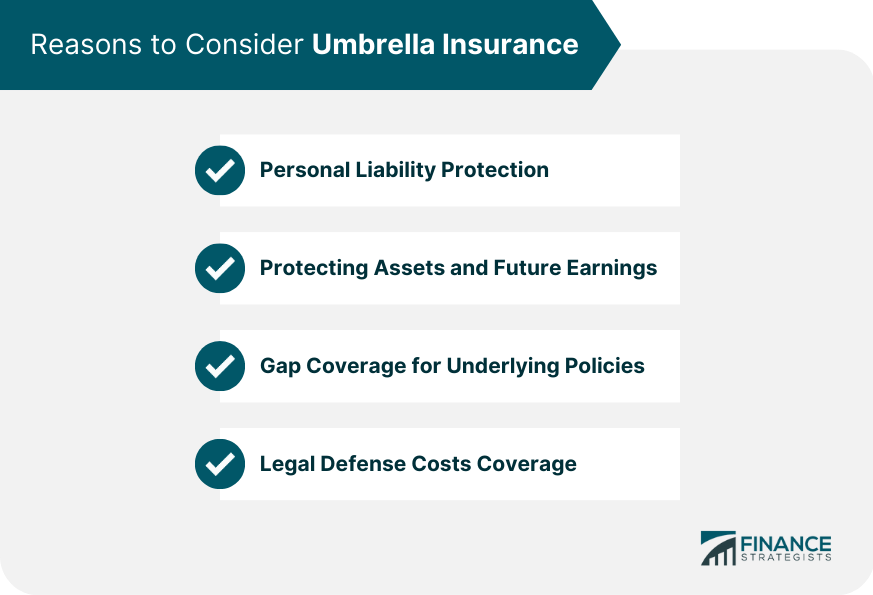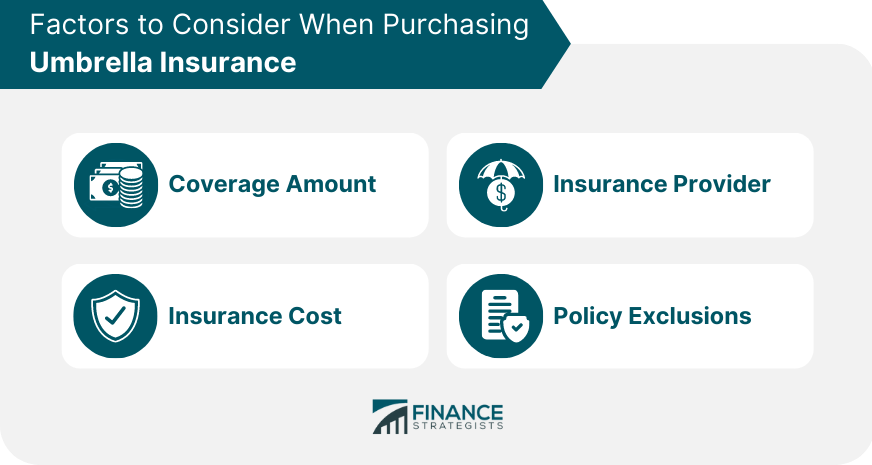Umbrella insurance is a form of personal liability insurance that covers claims in excess of regular homeowners, auto, or watercraft policy coverage. It acts as an additional layer of protection for the insured against potentially devastating lawsuits or claims. Owning umbrella insurance can provide peace of mind and financial security in the event of a large liability claim. With the rising costs of legal settlements and medical expenses, having this additional coverage can help protect personal assets and future earnings from being seized to satisfy a judgment. Umbrella insurance covers various types of liability claims, including personal injury, property damage, and certain types of personal liability situations. These policies can also cover legal defense costs, which can be a significant financial burden for the policyholder. Umbrella insurance is designed to provide additional coverage beyond the limits of standard insurance policies. In the event of a claim that exceeds the limits of an underlying policy, the umbrella policy will step in and cover the remaining costs, up to the policy limits. Umbrella insurance typically requires that the insured maintain certain levels of coverage on their underlying policies. This ensures that the umbrella policy will only be used for large, catastrophic claims and not for smaller, more routine incidents. Umbrella insurance policies have their own coverage limits, usually starting at $1 million and increasing in increments of $1 million. It is essential to select a coverage limit that accurately reflects the potential risk and the value of the insured's assets. Excess liability coverage is an important aspect of umbrella insurance. It refers to the additional coverage provided by the policy, beyond the limits of the underlying insurance policies. This extra layer of protection can be crucial in the event of a substantial liability claim. Many people mistakenly believe that umbrella insurance is only for the wealthy or those with significant assets. However, anyone can benefit from this type of coverage, as it protects not only current assets but also future earnings that could be at risk in the event of a lawsuit. Another common misconception is that umbrella insurance is too expensive or unnecessary. While the cost of a policy will vary based on factors such as coverage limits and personal risk, the peace of mind and financial protection it provides can far outweigh the expense. Umbrella insurance offers personal liability protection, which can be crucial in the event of an accident or injury for which the policyholder is held responsible. This coverage can help protect the insured's assets and financial future from the devastating effects of a large liability claim. Personal liability protection extends beyond the coverage provided by standard homeowners or auto insurance policies. It can cover situations not typically covered by these policies, such as slander, libel, or false imprisonment claims. One of the primary purposes of umbrella insurance is to protect the policyholder's assets and future earnings. In the event of a large liability claim, personal assets such as homes, cars, and savings accounts may be at risk of being seized to satisfy a judgment. Umbrella insurance can also protect future earnings, as wages may be garnished to satisfy a legal judgment. By providing additional liability coverage, an umbrella policy can help shield the policyholder's assets and future earnings from the potential consequences of a costly lawsuit. Umbrella insurance can help fill gaps in coverage that may exist in underlying insurance policies. For example, certain types of claims may be excluded from standard policies or subject to lower coverage limits. By providing additional coverage for these gaps, an umbrella policy can ensure that the policyholder is adequately protected in the event of a claim. This added layer of protection can be especially valuable in situations where the insured faces significant liability exposure or has multiple types of policies with different coverage limitations. Umbrella insurance can also cover legal defense costs, which can be a significant financial burden for the policyholder. In the event of a lawsuit, these costs can quickly add up, even if the insured is ultimately found not to be at fault. By covering legal defense costs, an umbrella policy can help alleviate some of the financial stress associated with a liability claim. This can allow the policyholder to focus on their defense and work towards a favorable outcome in the case. When purchasing umbrella insurance, it is essential to determine the appropriate coverage amount. This will depend on factors such as the value of the insured's assets, potential liability exposure, and the desired level of financial protection. In general, it is recommended to purchase an umbrella policy with a coverage limit that is equal to or greater than the total value of the policyholder's assets. This can help ensure that the insured is adequately protected in the event of a large liability claim. Selecting the right insurance provider is crucial when purchasing an umbrella policy. Factors to consider include the company's financial stability, reputation, customer service, and the specific policy offerings. Comparing quotes and coverage options from multiple providers can help the policyholder make an informed decision and ensure they are getting the best possible coverage at a competitive price. The cost of umbrella insurance will vary depending on factors such as the coverage limit, the insured's personal risk, and the insurance provider. In general, umbrella policies are relatively affordable, especially when considering the substantial amount of coverage they provide. It is essential to weigh the cost of the policy against the potential financial consequences of a large liability claim. For many individuals, the peace of mind and financial protection provided by an umbrella policy far outweigh the expense. Like any insurance policy, umbrella policies have certain exclusions and limitations. It is essential for the policyholder to carefully review their policy and understand what is and is not covered. Common exclusions may include intentional acts, business-related liabilities, and certain types of personal liability claims. Being aware of these exclusions can help the insured make informed decisions and take steps to mitigate potential risks. It is important for policyholders to regularly review and update their umbrella insurance coverage. This can help ensure that the policy continues to provide adequate protection as the insured's assets and liability exposure change over time. Regular reviews can also help identify any gaps in coverage or policy exclusions that may need to be addressed. This proactive approach can help minimize the risk of being underinsured in the event of a large liability claim. Coordinating umbrella insurance coverage with underlying policies is essential to ensure seamless protection. Policyholders should work closely with their insurance providers to ensure that their umbrella policy complements and supplements their existing coverage. This coordination can help prevent gaps in coverage and ensure that the umbrella policy is only used for large, catastrophic claims, as intended. In addition to purchasing umbrella insurance, policyholders should also practice effective risk management strategies to minimize their liability exposure. This can include maintaining a safe home environment, following safe driving practices, and being mindful of potential liability risks in everyday situations. By taking these proactive steps, policyholders can help reduce the likelihood of a large liability claim and ensure that their umbrella insurance provides the necessary protection when needed In conclusion, it is essential for individuals to weigh the benefits and costs of umbrella insurance. While the cost of a policy will vary based on factors such as coverage limits and personal risk, the peace of mind and financial protection it provides can far outweigh the expense. By carefully considering their personal liability exposure and the potential consequences of a large claim, individuals can make an informed decision about whether umbrella insurance is a valuable investment for their unique situation. Ultimately, making an informed decision about umbrella insurance requires a careful evaluation of personal assets, potential liability risks, and the desired level of financial protection. By considering these factors and working with a trusted insurance provider, individuals can select the umbrella policy that best meets their needs and provides the necessary protection in the event of a large liability claim. By understanding the value of umbrella insurance and making an informed decision about coverage, policyholders can enjoy greater peace of mind and financial security, knowing that they are adequately protected against the unexpected.What Is Umbrella Insurance?
Understanding the Basics of Umbrella Insurance
How Umbrella Insurance Works
Limits and Excess Liability
Common Misconceptions
Reasons to Consider Umbrella Insurance
Personal Liability Protection
Protecting Assets and Future Earnings
Gap Coverage for Underlying Policies
Legal Defense Costs Coverage

Factors to Consider When Purchasing Umbrella Insurance
Coverage Amount
Insurance Provider
Insurance Cost
Policy Exclusions

Tips for Managing Umbrella Insurance
Regularly Reviewing and Updating Coverage
Coordinating With Underlying Policies
Practicing Risk Management Strategies
Conclusion
Umbrella Insurance FAQs
Umbrella insurance is a type of liability insurance that provides additional coverage beyond the limits of your primary insurance policies.
Umbrella insurance covers a range of liability claims, including bodily injury, property damage, and personal injury claims.
Anyone who wants additional liability protection beyond the limits of their primary insurance policies should consider purchasing umbrella insurance.
The amount of umbrella insurance you need depends on your specific circumstances, but a general rule of thumb is to have enough to cover your net worth.
The cost of umbrella insurance varies depending on several factors, including the amount of coverage you need and your risk profile, but it is generally affordable and provides valuable protection.
True Tamplin is a published author, public speaker, CEO of UpDigital, and founder of Finance Strategists.
True is a Certified Educator in Personal Finance (CEPF®), author of The Handy Financial Ratios Guide, a member of the Society for Advancing Business Editing and Writing, contributes to his financial education site, Finance Strategists, and has spoken to various financial communities such as the CFA Institute, as well as university students like his Alma mater, Biola University, where he received a bachelor of science in business and data analytics.
To learn more about True, visit his personal website or view his author profiles on Amazon, Nasdaq and Forbes.















